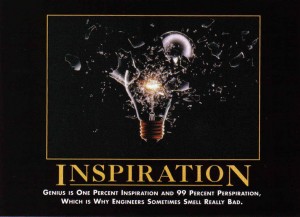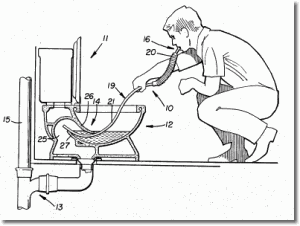Since nobody complained, here’s a great question regarding patents from an IMHO genuine and Certified Smart Guy, Erik, who took the trouble to e-mail me with this question regarding patents and how best to commercialize them:
I am writing you because I have ideas, but, do not know how to turn them into a business.
While at my university, I have been busy developing ideas and protecting these ideas with patents. I currently have 3 patent applications and am currently working on 2 more with a patent attorney. These are all through the university, so they do own 50% of rights to the patent, but at the same time, they are shouldering 100% of the costs. At this point in my life, that seems like a pretty good deal to me. Later when I have more money to invest, I can use any profit generated from these patents to own 100% of the rights to my work.
The problem is that I don’t really know how to move from owning a patent to creating a business to enable the idea and generate profit?
Erik is talking about transitioning from idea to business.
 Firstly, I would propose that ideas (and, their patents thereof) belong in the receptacle offered by the device in the carefully selected image, above …
Firstly, I would propose that ideas (and, their patents thereof) belong in the receptacle offered by the device in the carefully selected image, above …
… it’s all about execution. And, as we know; that’s 99% perspiration 😉
Given that, it seems Erik has quite a few paths available, to take Useless Idea # n to Highly Profitable Business # 1 [… and only. Because lighting rarely strikes twice yadayadayada], but I think I can summarize them into just two:
1. Become an idea/licensing machine: churn them out, begin the patent process, licence off … next idea!
http://7million7years.com/2008/09/08/if-its-not-passive-its-active/
http://7million7years.com/2008/09/09/how-to-build-a-perpetual-money-machine/
2. Pick the idea that Erik feels has the most commercial promise, fail fast (which means assess the market quickly by trying to get sales and feedback … even before the product is ready), continue with that idea OR shelve and move onto the next.
http://7million7years.com/2010/04/28/the-no-marketing-plan/
And, this series: http://7million7years.com/2011/03/07/anatomy-of-a-startup-part-v/
Having never done 1., I can’t advise Erik (that may be where you step in?) …
However, if Erik is contemplating going down the second path, he should pick the easiest patents, first … preferably something that can be implemented (at least at first) as software … using open-source architectures wherever possible and ‘”off the shelf” programmers (i.e. no PHD’s to develop, unless that’s going to be Erik).
In terms of resources, Erik should follow interesting threads on quora.com … he’ll learn a lot, from experts (unfortunately, he’ll first have to learn how to discern ‘expert’ from ‘wanna be’).
He should also buy a copy of TechStar Founder, Brad Feld’s excellent book about startups: Do More Faster: TechStars Lessons to Accelerate Your Startup, and Guy Kawasaki’s outstanding book: The Art Of The Start.
Once he has launched and has gained traction (i.e. significant customers and sales; not necessarily profitable sales … yet), Erik can start working on building his back-end ‘business’ … in which case, he should also read Michael Gerber’s business classic – mandatory for established businesses of ANY size: The E-Myth Revisited.
Until then, Erik should focus totally on Product (what do the customers want?) and Sales (will they buy?) …
He can start testing/asking/even selling RIGHT NOW.
Oh, and if Erik has the opportunity to take a job, but start this part-time … he should do so!
That way he’ll be able to afford to fail often 😉






Adrian,
Thank you so much for your great advice! I do have an application for a patent that can be mostly implemented with software (even though it is not a software patent). Unfortunately, I will not be able to use open source code to accomplish… The good news is that I have access to many computer science graduate students who will gladly work for much less than what I would pay someone professionally.
If anyone has additional advice on the licensing end, I would love to hear your thoughts as well.
Thanks,
Erik
The best advice you gave is right on and that is to read Kawasaki’s book “The Art of The Start”. More often than not the patents aren’t worth the paper and ink used to print them but like Guy says…
“they make your parents proud”.
@ PMI – Nice! But, I think that’s more true with web / software than it is for some physical products; Guy’s book, too, is more aimed at the web/software sector.
@ Erik – Why license? If mostly code … and, relatively cheap code at that (!) … why not bring it to market yourself?
Seems Erik needs to first figure out where these products are useful. I.E. automotive arena,home building ,whatever the place. He needs to first know what these patents can be most useful. Then Develop his elevator speech (as you ,Adrian have addressed in past writings).He will then need to pitch these patents to the right people who could eventually buy the rights to use or buy the rights to own.
I read about a guy who had like 18 or more patents on things to do with automotive transmissions. Every care manufacturer who wishes to develop electric cars, needs to use this same tech to transfer power form battery to wheels.He makes loads of cash licensing the rights to use this to several different Companies.Think Ford,Toyota and a host of others around the world.
@ Steve – Yes. Scott (an actor and inventor) is much the same, except with kitchen gadgets.
I am buying the Art of the Start and will give it a read. Thank you everyone for your input!
@ Adrian – I spoke with Scott Evans yesterday and he was extremely helpful! I am definitely going to bring one of my patents to market myself. The other two are more difficult to implement, and don’t have as broad of a market, so they may be better for licensing. I’ll let you know how it goes!
If I could add a bit more abstract advice. One of the greatest reasons why ideas crash, in what I’ve seen around me, is that the “give up” threshold is too low.
One way to overcome this, is to generate a strong vision for what you want to achieve with all of this. Then keep your eyes on that vision, so that when you hit obstacles (and you will), you can keep your eyes on the vision, and find a way around/over/through the obstacle.
Very often I’ve seen success, just on the other side of what everyone around the successful person had thought was the “final failure.”
@ Ashton – Great advice! I call “generating a strong vision” Finding Your Life’s Purpose.
Once you know what you REALLY want to do with your life (which MAY include working, but probably won’t … at least, not licking stamps at the Post Office), then you can work out how much money you need. I call that Your Number.
Once you know Your Number, well, that really lights a fire under your ideas 😉
AJC,
Regarding the diagram in this post, is the guy blowing into the tube or sucking on it?
Maybe the patent is a device to prevent the ‘water’ from coming up through the tube! Bleech.
-Mike
Well, I can’t really disclose ALL the details of the patent :))